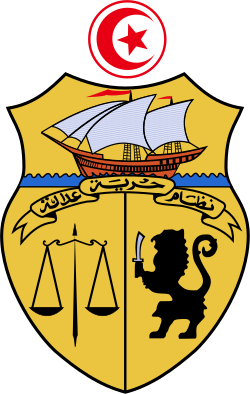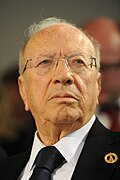 |
|---|
|
| |
The president of Tunisia is the head of state of Tunisia, directly elected to a five-year term by the people. The officeholder leads the executive branch of the Tunisian government along with the prime minister and is the commander-in-chief of the Tunisian Armed Forces.
Contents
Since the office was established in 1957, five men have served as president. The seventh and current president is Kais Saied since 23 October 2019. There are currently three living former presidents. The most recent former president to die was Zine El Abidine Ben Ali, on 19 September 2019.
The presidency of Mohamed Ennaceur, who assumed the office as acting president following the death of incumbent president Beji Caid Essebsi, was the shortest in Tunisian history (90 days). Habib Bourguiba, the inaugural holder, served the longest, over thirty years (1957–1987), before he was removed from office by his prime minister Ben Ali, on 7 November 1987. Since the ratification of the Tunisian Constitution in 2014, no person may be elected president more than twice.
Of those who have served as the nation's president, only one died in office of natural causes (Beji Caid Essebsi), two were removed from office (Habib Bourguiba and Zine El Abidine Ben Ali) and two assumed the office as acting presidents (Fouad Mebazaa and Mohamed Ennaceur).









